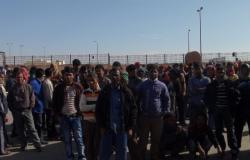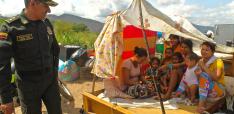Eritrea Chairs Dialogue on Migration: A Strange Partner

With Eritrea, a strange partner has taken over the chair of the “Khartoum Process”, the forum for EU-African dialogue on migration.
In early March 2019, the Eritrean government has taken over the chair of the forum in which Europe and states from the Horn of Africa discuss the critical question of migration. Known as the ‘Khartoum process’, after the Sudanese capital in which the relationship was struck, it is both influential and poorly understood by the general public. This is no accident. Images of Africans drowning in the Mediterranean, their bodies washed up on Italian beaches, have appalled many.
The projects and programmes implemented under the Khartoum Process are often hard to grasp, and have been far from transparent, but it is apparent that there is a divergence between the EU’s apparent commitment to human rights and its explicit policy of working with African states to restrict migration by almost any means. Concerns were heightened when minutes of a meeting of the ambassadors of the 28 EU member states on 23 March 2016 leaked in the German magazine Der Spiegel. They contained this chilling warning: ‘Under no circumstances’ should the public learn what was being discussed. The magazine said equipment would be sent to Sudan to assist in the control of its refugee population. Despite these concerns these transfers have taken place. A regional operational centre is now up and running in Khartoum, staffed by European civil servants, with links to the Sudanese security forces.
The relationship between states of the Horn of Africa and the EU has been gradually fostered since May 2012. Spurred on by the rising number of Africans crossing the Mediterranean it is governed by a steering committee. This is made up of five EU Member States (Italy, France, Germany, UK, Netherlands) and five African partners (Egypt, Eritrea, Ethiopia, South Sudan, Sudan). They are served by the European Commission, the European External Action Service and the African Union Commission.
Eritrea’s poor state of democracy
During 2018 Italy chaired this dialogue, now the Eritrean government has taken control. It is worth stopping for a moment to consider just what this implies: the key decisions affecting Africans as they flee repression and conflict are being steered by one of the most dictatorial countries in the world. The nature of the Eritrean state is revealed clearly in the Bertelsmann Transformation Index. The BTI measures the current state of democracy and market economy in 129 countries worldwide, its evolution over the past two years and the quality of governance performed by its leadership. In the 2018 report, few countries have a lower rating than Eritrea, which ranks 128 out of 129 in terms of the governance index, 126 in terms of the political transformation and 127 in economic transformation.
The country report states: “Since Eritrea’s independence in 1993, there have been no elections on the national or regional (zoba) levels and no free elections on the sub-regional and local levels. The PFDJ [the ruling party] remained the only legal political party, and President Isaias Afewerki, who has been in power since independence, showed no readiness to accept elections or any change in the country’s political status quo.” The report goes on to explain the measures that are taken to retain this monopoly of power. Minorities, religious groups and other political parties face ruthless repression, with no recourse to the courts or parliament. “Separation of powers including checks and balances is nonexistent both de jure and de facto, as Eritrea has no implemented constitution. A small number of high-ranking cadres of the ruling PFDJ and the government form a monolithic power apparatus, and the parliament is not convened.”
The EU adheres to human rights
In the circumstances, is it any surprise that Eritrean citizens continue to flee the country, risking all to seek a better life? This has continued despite dramatic changes in the region in 2018. In June the newly-elected Prime Minister of Ethiopia, Abiy Ahmed visited the Eritrean capital, Asmara for the first time in almost 20 years. He received an ecstatic welcome from the Eritrean public, who hoped that his arrival marked the end of tensions over their mutual border. Ethiopia’s refusal to accept a binding international decision on the border, over which the two countries fought a ferocious war (1998 – 2000), had been the stumbling block to a normalisation of relations. Prime Minister Abiy’s decision to reverse Ethiopian policy and accept the border demarcation opened the way to a new era between his country and Eritrea. This is now being shaped. What has not been transformed are the internal politics of Eritrea itself. The absence of democracy, the severity of the human rights abuses and the inability of ordinary men and women to shape their own lives has in no way been transformed.
European diplomats are well aware that this is the case. Despite this the EU has accepted Eritrea as the chair of the Khartoum process, in an apparent contravention of the EU’s avowed to adhere to human rights in all its activities as well as its commitment to the protection of refugees and migrants. One is forced to observe that Brussels has found a strange partner with which to fulfil these objectives.
Martin Plaut is a freelance journalist and Senior Research Fellow, Horn of Africa and Southern Africa, Institute of Commonwealth Studies. He is the former Africa Editor of BBC World Service News.
Image credit: EU Civil Protection and Humanitarian Aid Organisation via Flickr (CC BY-ND 2.0)

